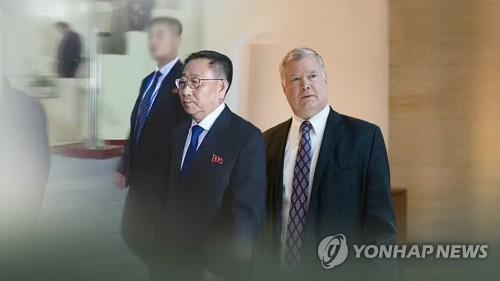
U.S.-N.K. nuclear talks end in conflicting assessments

Washington: The United States and North Korea ended working-level denuclearization negotiations in Sweden Saturday, with the North declaring a breakdown of talks and the U.S. characterizing the discussions as “good.”
Negotiators from the two sides met in Stockholm to resume denuclearization talks that had stalled since the collapse of February’s second summit between U.S. President Donald Trump and North Korean leader Kim Jong-un.
Kim Myong-gil, the North’s chief negotiator, told reporters after meeting with his U.S. counterpart, Stephen Biegun, that the talks broke down to the failure of the U.S. to come up with a new proposal.
Expressing his “great displeasure,” he said he had called for suspending the negotiations and urged the U.S. to deliberate until the end of the year.
He also said it will be up to the U.S. to correct its course and keep the dialogue alive or “forever close the door to dialogue.”
Whether Pyongyang continues its self-imposed moratorium on nuclear and intercontinental ballistic missile tests, or “revives” them, he said, will also depend entirely on the U.S.
The U.S. offered a more measured response.
“The early comments from the DPRK delegation do not reflect the content or the spirit of today’s 8 and 1/2 hour discussion,” State Department spokeswoman Morgan Ortagus said in a statement, referring to the North by its official name, the Democratic People’s Republic of Korea.
“The U.S. brought creative ideas and had good discussions with its DPRK counterparts,” she said, adding that the U.S. delegation also “previewed a number of new initiatives that would allow us to make progress” on each of the four main agreements reached at the first Trump-Kim summit in Singapore in June 2018.
That summit produced an agreement committing the North to “work toward” complete denuclearization of the Korean Peninsula in exchange for U.S. security guarantees. It also called for building a lasting peace regime on the Korean Peninsula, establishing new ties between the two countries, and repatriating the remains of American troops killed in the 1950-53 Korean War.
Ortagus said that at the end of the meeting, the U.S. proposed accepting Sweden’s invitation to return to Stockholm in two weeks time to continue discussions. The U.S. accepted that invitation, she said.
“The United States and the DPRK will not overcome a legacy of 70 years of war and hostility on the Korean Peninsula through the course of a single Saturday,” Ortagus noted. “These are weighty issues, and they require a strong commitment by both countries. The United States has that commitment.”
The two countries have wrangled over how much the North should denuclearize before it receives sanctions relief and security guarantees from the U.S.
That gap caused the second summit in Vietnam to end without a deal.
Recent months have seen North Korea resume its testing of short-range ballistic missiles, although it has refrained from conducting nuclear weapons or long-range missile tests since beginning diplomacy with the U.S. early last year.
On Wednesday, the regime tested a submarine-launched ballistic missile in a move apparently aimed at increasing its leverage in talks with the U.S.
Along with its ICBMs, the North’s SLBM program is considered one of the biggest threats to the U.S. and its allies, as it could extend the range of the North’s nuclear missiles. SLBMs are also hard to detect before they emerge from the water.
Asked if the North had gone too far this time, Trump said Thursday: “They want to talk, and we’ll be talking to them soon. We’ll see.”
Trump shrugged off the previous launches of short-range ballistic missiles as no big deal, saying those launches did not violate Kim’s promise to stop nuclear and long-range missile tests.
Washington has demanded that under a big-picture scheme, Pyongyang take sweeping denuclearization steps, insisting that sanctions relief will follow substantive progress in its denuclearization.
Pyongyang has called for an early easing of sanctions in return for its disarmament steps, while sticking to a piecemeal, step-by-step method that could help it string out negotiations and wring more concessions from Washington.
Trump suggested last month that a “new method” could be good to move the negotiations forward, a remark that was welcomed by the North.
If the working-level talks produced progress, a third summit between Trump and Kim was widely expected to happen before the end of the year.
En route to Stockholm, Kim Myong-gil had struck an optimistic tone.
“As the U.S. side sent a new signal, I bear high expectations and optimism,” he told reporters in Beijing Thursday. “I am also optimistic about the results.”
YONHAP


